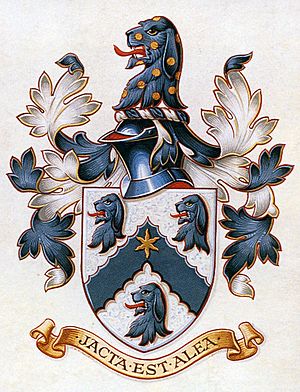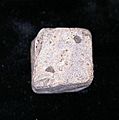Alea iacta est facts for kids

The motto of the Hall family from Shackerstone says jacta est alea.
Alea iacta est is a famous Latin phrase. It means "the die has been cast" or "the dice has been thrown." Imagine playing a game with dice; once you throw it, you can't change the outcome. This phrase means that important decisions have been made, and there's no turning back.
The Roman historian Suetonius wrote that Julius Caesar said these words on January 10, 49 BC. At that time, Caesar led his army across the Rubicon river in Northern Italy. Crossing this small river was a huge step. It meant starting a civil war against the Roman Senate. By saying "Alea iacta est," Caesar showed he was fully committed to his decision, no matter what happened next.
Images for kids
-
A Roman die, made from lead
See also
 In Spanish: Alea iacta est para niños
In Spanish: Alea iacta est para niños
Black History Month on Kiddle
Distinguished African-American Artists:
 | Sharif Bey |
 | Hale Woodruff |
 | Richmond Barthé |
 | Purvis Young |

All content from Kiddle encyclopedia articles (including the article images and facts) can be freely used under Attribution-ShareAlike license, unless stated otherwise. Cite this article:
Alea iacta est Facts for Kids. Kiddle Encyclopedia.

